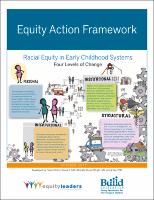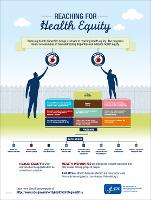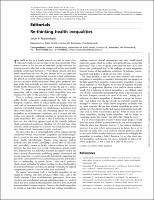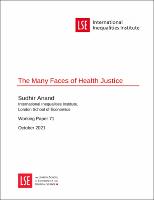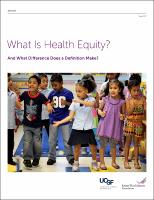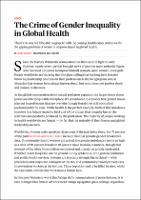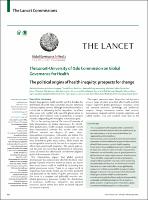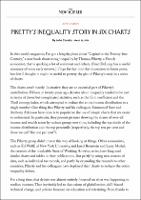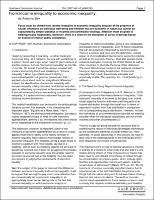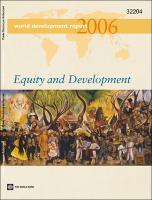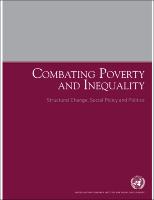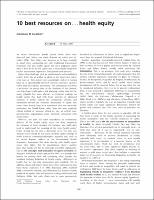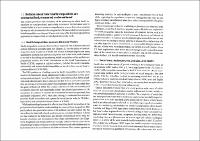1.01.01 Inequality vs Inequity
Recent Submissions
Equity Action Framework
(2017)
Th e Equity Action Framework1 is designed to support individuals and groups that want to advance racial equity
in early childhood systems. Th e goal of a racial equity approach is to develop policies, practices, and programs that
provide opportunities, promote fairness and access, and remediate racial inequities.
Whether working at national, state, county, or municipal levels of government, in private-public partnerships,
community organizations, foundations or other entities, the Equity Action Framework provides an intentional
process for...
Reaching for Health Equity
(US CDC, 2016)
Re-thinking health inequalities
(Oxford University Press on behalf of The European Journal of Public Health, 2020-06-19)
The Many Faces of Health Justice
(The London School of Economics and Political Science, October 20)
This paper develops the idea of health justice as a plural conception. It draws on the literature on justice from philosophy and economics, and investigates its application and reach in the space of health. Several distinctions are invoked in identifying and contrasting different facets of health justice and injustice. These include active versus passive injustice; process fairness versus substantive justice; comparative versus noncomparative justice; compensatory and distributive justice. Within distributive justice, the health implications of...
What Is Health Equity? And What Difference Does a Definition Make?
(2017)
This report from the Robert Wood Johnson Foundation aims to stimulate discussion and promote greater consensus about the meaning of health equity and the implications of acting on it. The goal of the report is to identify essential elements to guide effective action rather than to encourage all practitioners to use the same words to define health equity. The report notes that definitions can matter and that, in the case of health equity, clarity is important, especially given that working towards equity is a struggle that must engage diverse st...
The Crime of Gender Inequality in Global Health
(Voice-Foreign Policy)
The political origins of health inequity: prospects for change
(The Lancet - University of Oslo Commission on Global
Governance for Health, 2014)
Despite large gains in health over the past few decades, the distribution of health risks worldwide remains extremely and unacceptably uneven. Although the health sector has a crucial role in addressing health inequalities, its efforts often come into conflict with powerful global actors in pursuit of other interests such as protection of national security, safeguarding of sovereignty, or economic goals.
This is the starting point of The Lancet–University of Oslo Commission on Global Governance for Health. With globalisation, health inequity i...
Health, Disability and the Capability Approach: An Introduction
(Journal of Human Development and Capabilities, 2015)
This special issue of the Journal of Human Development and Capabilities focuses on two
areas of substantial and growing importance to the human development and capability
approach: disability and health. The research on disability, health and the capability
approach has been diverse in the topics it covers, and the conceptual frameworks and methodologies
it uses, beginning over a decade and a half ago in health (Ruger 1998) and more
than a decade ago in disability (Baylies 2002).1 We are pleased to share a set of articles in
these two are...
Piketty’s Inequality Story in Six Charts
(The New Yorker, 2014)
From income inequality to economic inequality.
(Southern Economic Journal, 1997)
Focus must be shifted from income inequality to economic inequality because of the presence of causal influences on individual well-being and freedom that are economic in nature but cannot be expounded by simple statistics of incomes and commodity holdings. Attention must be given to heterogeneous magnitudes. Moreover, there is a need for the derivation of partial orderings based on explicit or implicit public acceptance.
Equality of What?
(Cambridge: Cambridge University Press., 1979)
Well-being is not just a question of the wealth or pleasure that a person has; it is a question of how people manage to live their lives and the ability they have to do certain things that are important to them. This was the argument put forward by Professor Amartya Sen in 1979. In his seminal Tanner Lecture – ‘Equality of What?’, Sen unites economics and philosophy to explore how a person’s well-being might best be measured. It was the first in a series of writings in which he developed his capability approach. This focuses on the actual capab...
Regional strategy on health system strengthening and primary health care
(Manila : WHO Regional Office for the Western Pacific, 2010)
World Development Report 2006: Equity and Development
(World Bank Publications, 2005)
The World Development Report 2006: Equity and Opportunitypresents a social development strategy organized around the themes of social inclusion, cohesion, and accountability. It examines equality of opportunities--a potentially important factor affecting both the workings of the investment environment and the empowerment of the poor--by building on and extending existing accountability frameworks presented in the 2005Report.
Combating poverty and inequality: structural change, social policy and politics
(United Nations Research Institute for Social Development, 2010)
Poverty reduction is a central feature of the international development agenda and contemporary poverty reduction strategies increasingly focus on “targeting the poor”, yet poverty and inequality remain intractable foes.
Combating Poverty and Inequality argues that this is because many current approaches to reducing poverty and inequality fail to consider key institutional, policy and political dimensions that may be both causes of poverty and inequality, and obstacles to their reduction. Moreover, when a substantial proportion of a country’s ...
Child Poverty and Inequality: New Perspectives
(2012)
The 21st century starts with vast inequalities for children in terms of income, access to food, water, health, education, housing, or employment for their families. Half of the world’s children are below the poverty line of $2 a day and suffer from multiple deprivations and violations to basic human rights. More than 22,000 children die each day, and most of their deaths are preventable. This volume presents some of the critical acknowledged voices to move a necessary agenda forward. It explains multidimensional poverty measurements, describes ...
10 best resources on ... health equity
(Oxford University Press in association with The London School of Hygiene and Tropical Medicine, 2007)
An astute bureaucratic pundit named Rufus Miles once observed that ‘where you stand depends on where you sit’ (Miles 1978). This ‘Miles Law’ deserves to be kept centrally in mind when considering not only traditional bureaucratic behaviour, but also health equity; for one's judgment about what's ‘best’ in the health equity area is unavoidably shaped by his/her institutional experience, background and interests.Rather than challenge such an unfortunately well-established reality, better for an author to admit at the outset just where (s)he has s...
Health inequalities: critical perspectives
(Oxford University Press, 2016)
This section provides a brief summary of the main ways in which health in-equalities are conceptualized, particularly in terms of the indicators used to stratify health. It is by no means a comprehensive account but rather considers the ways in which researchers focusing on the UK have tended to conceptualize health inequalities over the past 30 years and some of the key chalenges to these approaches (critiques which are developed later in this book).

